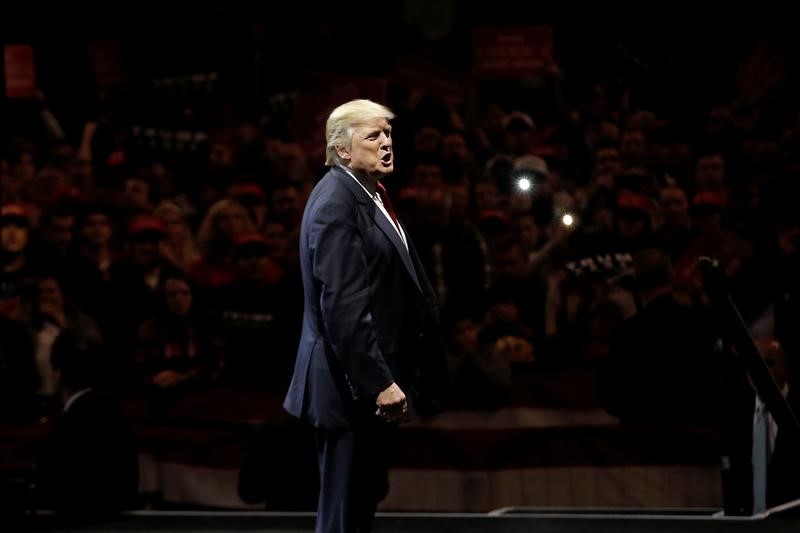By Nick Carey and Ginger Gibson
CHICAGO/WASHINGTON (Reuters) - U.S. President-elect Donald Trump's challenges to China on trade and Taiwan are rattling American companies who have long benefited from stable relations between the two countries but now fear retaliation by Beijing if Trump were to act.
Trump jarred Chinese officials on Sunday by saying the United States did not necessarily have to stick to its long-standing position that Taiwan is part of "one China." Beijing expressed "serious concern" about Trump’s remarks.
Four U.S. industry sources who follow China policy closely said they were unsettled by any suggestion of abandoning the "one China" policy, which they said had served the business community well for several decades.
The sources, who spoke on condition of anonymity because of the sensitivity of the issue, stressed the importance of stability for businesses. They said Beijing could retaliate against U.S. companies that do business in China if Trump takes his tougher line too far.
"The Chinese are deeply concerned and we hear now from reliable sources in Beijing who suggest the Chinese government, the Communist Party, are developing lists of U.S. interests against which they could retaliate, commercial interests, and obviously one merely has to look at top U.S. exports to China to get a quick sense of whose heads may be on the chopping block," said one China trade policy expert who interacts closely with U.S. business.
The expert pointed out that more than 30 states have over $1 billion in exports to China and that there is over $500 billion in commercial engagements by U.S. companies in China. All of that would be at risk if China retaliated.
"That commercial engagement supports American jobs, many American jobs here in the United States," the expert said.
Another source said there had been "quiet outreach" by the U.S. business community to Trump's advisers but companies were wary of discussing their concerns about the China policy publicly for fear of becoming a target for the president-elect, who has singled out companies such as Carrier and Boeing (NYSE:BA).
From Detroit's car makers to Silicon Valley's technology champions, China is both a critical source of revenue and profits, and a vital link in global supply chains.
More than four decades after President Richard Nixon upset the status quo of his time with a surprise visit to Beijing, what's good for U.S.-China relations is good for General Motors and Starbucks and Apple (NASDAQ:AAPL) and Wal-Mart Stores Inc. (NYSE:WMT)
China has hit U.S. goods with retaliatory tariffs in the past when disputes flared. China in 2011 slapped duties on U.S.-made large cars and sport utilities as part of a trade dispute.
The stakes are higher now.
More than one-third of the 9.96 million vehicles General Motors Co (NYSE:GM) sold globally in 2015 were delivered to Chinese customers. Profits from Chinese operations, including joint ventures, accounted for about 20 percent of GM's global net income of $9.7 billion in 2015. Ford Motor (NYSE:F) Co's China JVs represented about 16 percent of its global pre-tax profit of $9.4 billion in 2015.
U.S. retail giant Wall Mart Stores Inc has 432 stores in China, while coffee chain Starbucks Corp (NASDAQ:SBUX) has 2,500 stores there and outgoing CEO Howard Schultz told investors China will one day be a bigger market for the firm than the United States.
Aircraft maker Boeing Co plans to build a "completion" factory in China for its 737 jets, anticipating the country will need 6,800 new jetliners worth $1 trillion over the next 20 years.
"The United States and China are in a symbiotic relationship, we are wed to each other and do best when we grow together," said Susan Aaronson, a professor at George Washington University who teaches corruption and good governance.
The total value of U.S. trade with China was $599 billion in 2015, according to the U.S. Census Bureau, of which $116 billion was exports to China from U.S. producers, while U.S. companies imported $483 billion in goods from China.
Alan Deardorff, professor of international economics and public policy at the University of Michigan, said that if U.S.-China trade tensions were to reach a boiling point, "the pain would be widespread and deep” for U.S. businesses.
Trump and his advisers have said the U.S.-China trade deficit reflects bad trade deals and currency manipulation by the Chinese government, which they said justifies a tougher response than in the past.
George Washington University's Aaronson said that while Taiwan is a sensitive topic, if Trump pushes ahead with trade tariffs that is far more likely to translate into retaliation against U.S. firms in China.

"China's leaders need stability and Trump is totally disruptive," Aaronson said. "They will need to signal their strength in return."